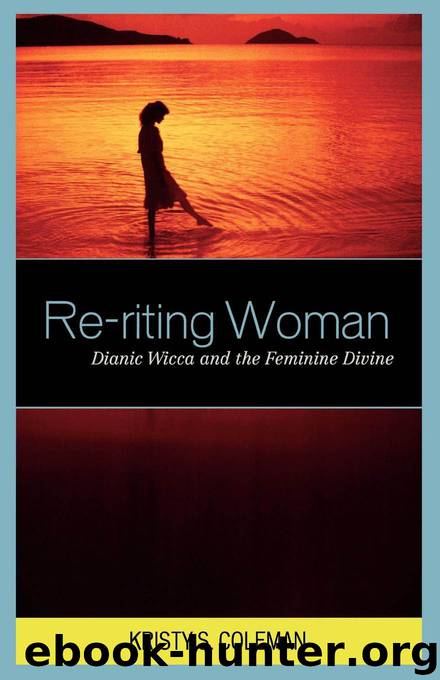Re-riting Woman: Dianic Wicca and the Feminine Divine (Pagan Studies Series) by Coleman Kristy S

Author:Coleman, Kristy S.
Language: eng
Format: epub
Publisher: AltaMira Press
Published: 2009-03-15T16:00:00+00:00
Irigaray’s Place in Philosophy
Representation of the world, like the world itself, is the work of men; they describe it from their own point of view, which they confuse with absolute truth.
— Simone de Beauvoir15
We need to reinterpret everything concerning the relations between the subject and discourse, the subject and the world, the subject and the cosmic, the micro-cosmic and the macrocosmic. Everything, beginning with the way in which the subject has always been written in the masculine form, as man, even when it claimed to be universal or neutral.
— Luce Irigaray16
Irigaray’s philosophical analysis challenges the perception that feminist issues are only of interest to women. Through Irigaray’s illumination of the “blind spot” of phallocentric speculations, she attempts to release that which is erased, repressed, forgotten, and unasked in Western culture—the feminine—as well as to disclose the masculinist discourse that disseminates its views as reality. Discourse concerned with the nature of being (metaphysics) is not restricted to the field of philosophy, rather it becomes a part of, and affects, everyday life.
We cannot appreciate Irigaray’s proposal that women need a culture that conforms to their own sensibilities without first understanding the context of that problem. According to Irigaray, Western culture’s dominant system of representation (language, symbols, and the imaginary) reflects men’s exclusive access to determine the face of philosophy, religion, and metaphysics. These knowledges retain and reproduce a dualistic system that privileges the male. Irigaray substantiates that this totalizing, exclusive system is the underlying foundation of Western culture by entering the conversation of Western philosophy in a lineage that flows from Plato through Descartes, Hegel, Heidegger, Husserl, Lévinas, and Derrida. Irigaray exposes the erasure and forgotten foundation of maternal origin and the feminine in the classic texts of philosophy, as well as in more recent works—even by those most valiant unconventional thinkers such as Nietzsche, Freud, and Derrida. Further, her disclosure of this blind spot blemishes the competence of their philosophical speculations.
Irigaray finds the lack of “sexual difference” motif so pronounced and recurrent that she names it the unquestioned foundation of Western metaphysics.17 She agrees in part with her masculine predecessors who propose that “ ‘woman’ does not exist.”18 Irigaray explains that because the formulaic structure of the Western economy of representation presupposes the male model as the norm, woman can only be defined as different from man, as the not-man. Women are consistently found lacking and defective as a result of this unchallenged algorithm. Irigaray characterizes this underlying binary logic as “he is/she is ‘not.’ ”
In Western culture’s system of representation, Irigaray explains that women are without subjectivity: “The feminine cannot signify itself in any proper meaning, proper name, or concept, not even that of woman.”19 Instead, women are relegated to being “frozen mirrors” that reflect back men’s image of themselves, assuring men of their existence and their subjectivity. Such prescribed interactions limit women’s existence to that of mothers and mirrors. Furthermore, Irigaray explains, in man’s quest for his own idealized subjectivity, his undesirable human limitations become associated with woman (for
Download
This site does not store any files on its server. We only index and link to content provided by other sites. Please contact the content providers to delete copyright contents if any and email us, we'll remove relevant links or contents immediately.
| Paganism | Wicca |
| Witchcraft |
Becoming Supernatural by Dr. Joe Dispenza(8201)
Crystal Healing for Women by Mariah K. Lyons(7928)
The Witchcraft of Salem Village by Shirley Jackson(7257)
Inner Engineering: A Yogi's Guide to Joy by Sadhguru(6785)
The Four Agreements by Don Miguel Ruiz(6745)
The Power of Now: A Guide to Spiritual Enlightenment by Eckhart Tolle(5757)
Secrets of Antigravity Propulsion: Tesla, UFOs, and Classified Aerospace Technology by Ph.D. Paul A. Laviolette(5367)
The Wisdom of Sundays by Oprah Winfrey(5153)
Room 212 by Kate Stewart(5105)
Pale Blue Dot by Carl Sagan(4996)
Fear by Osho(4727)
The David Icke Guide to the Global Conspiracy (and how to end it) by David Icke(4709)
Animal Frequency by Melissa Alvarez(4462)
Rising Strong by Brene Brown(4451)
How to Change Your Mind by Michael Pollan(4355)
Sigil Witchery by Laura Tempest Zakroff(4238)
Man and His Symbols by Carl Gustav Jung(4131)
The Art of Happiness by The Dalai Lama(4125)
Real Magic by Dean Radin PhD(4121)
